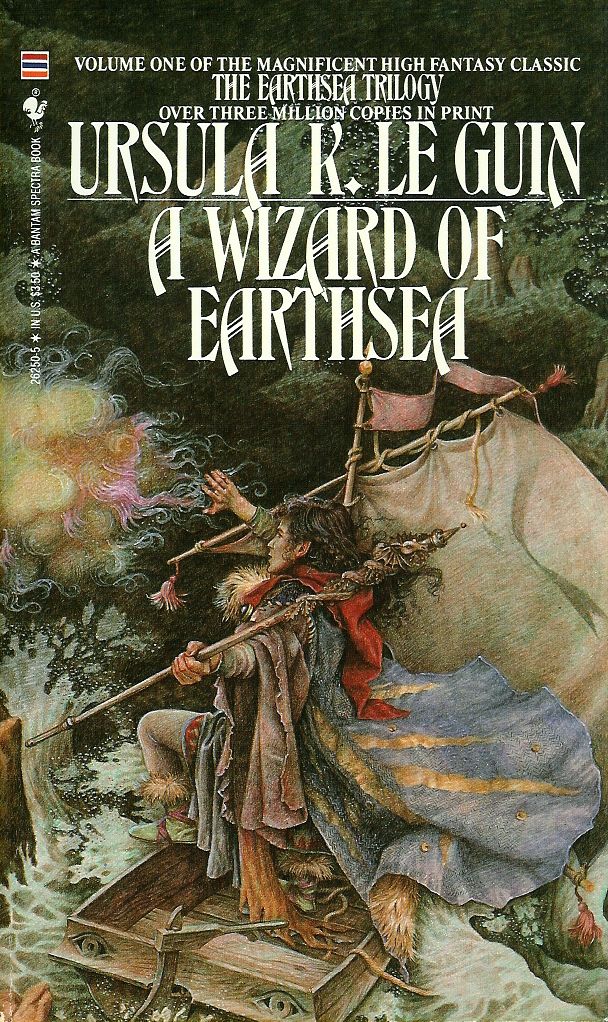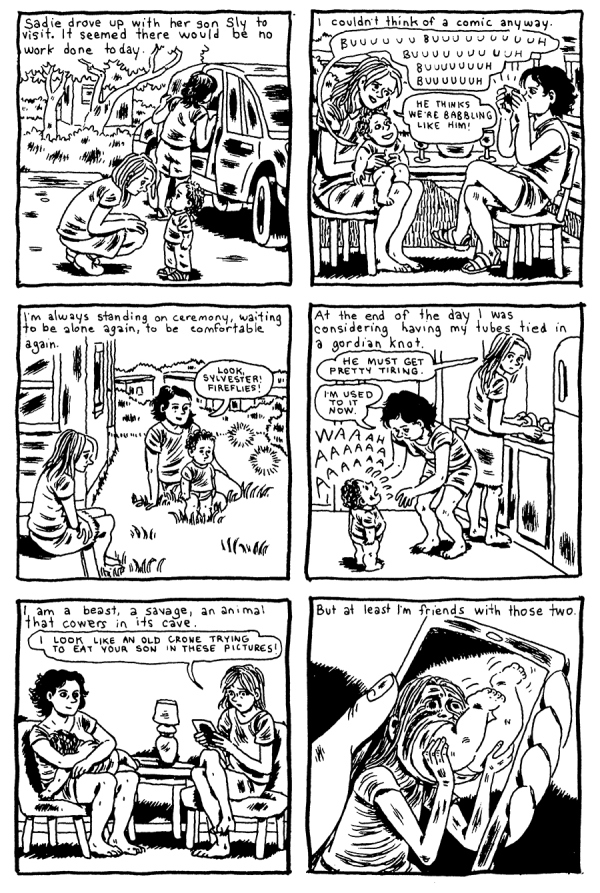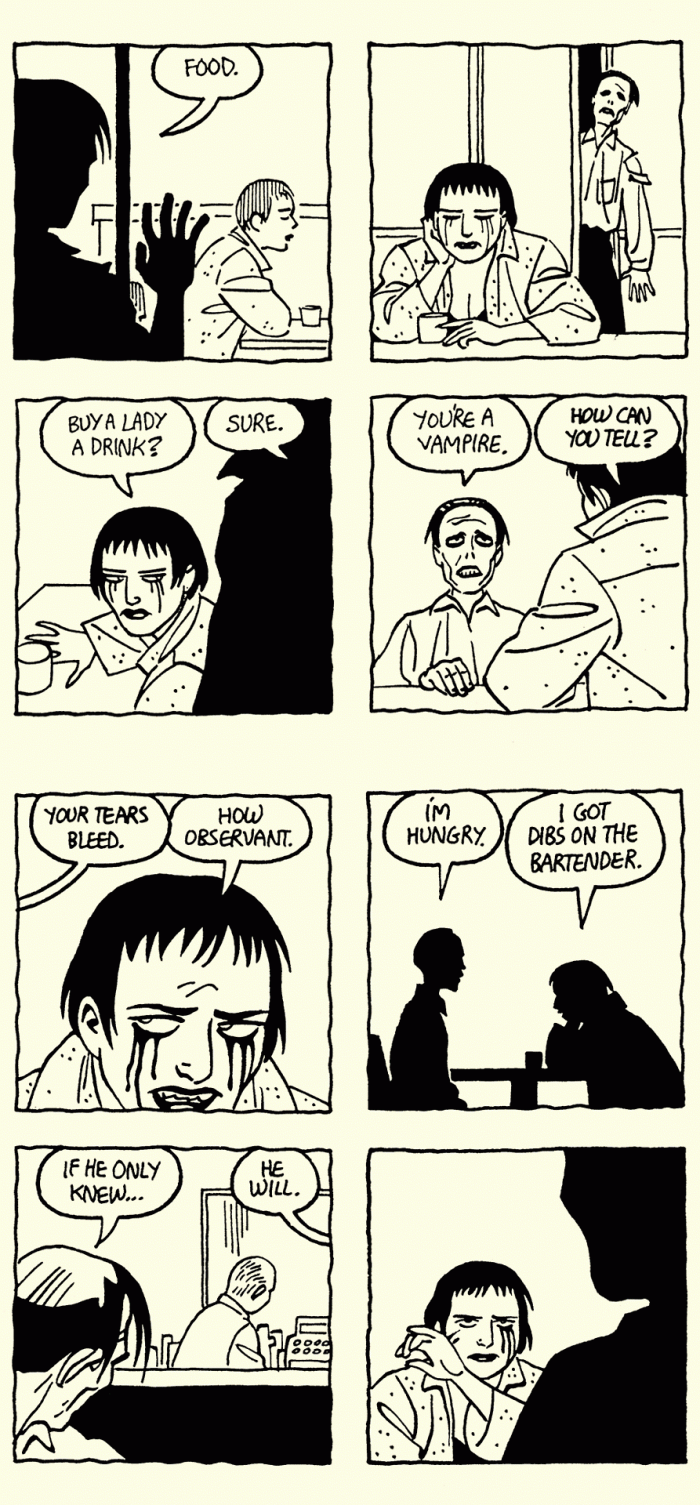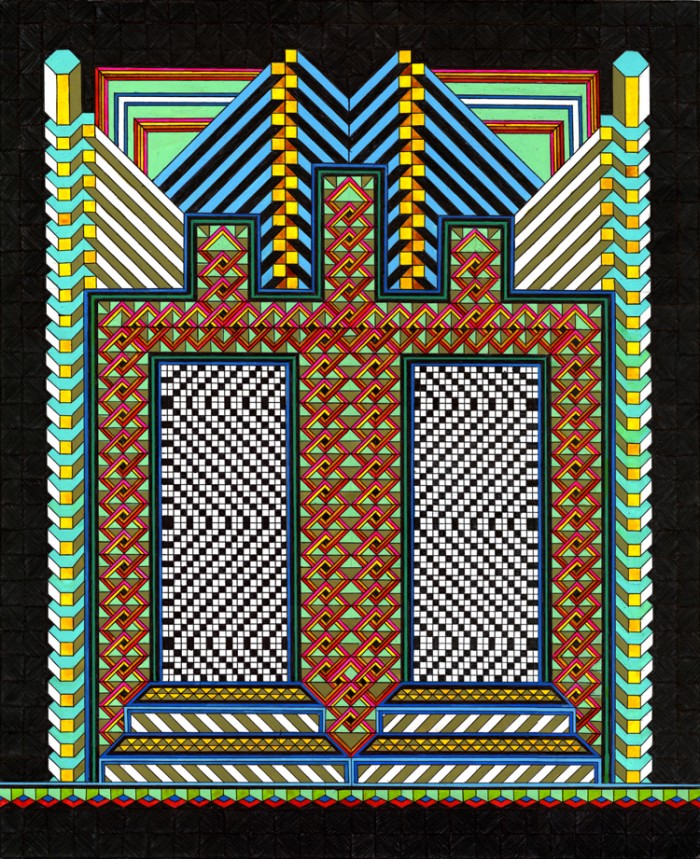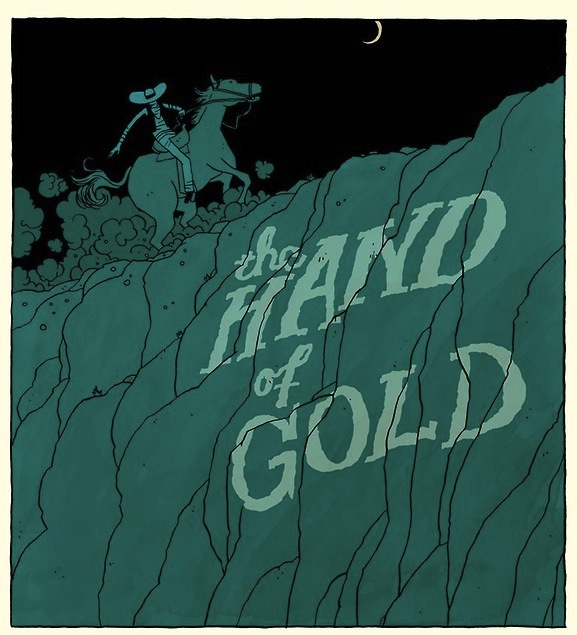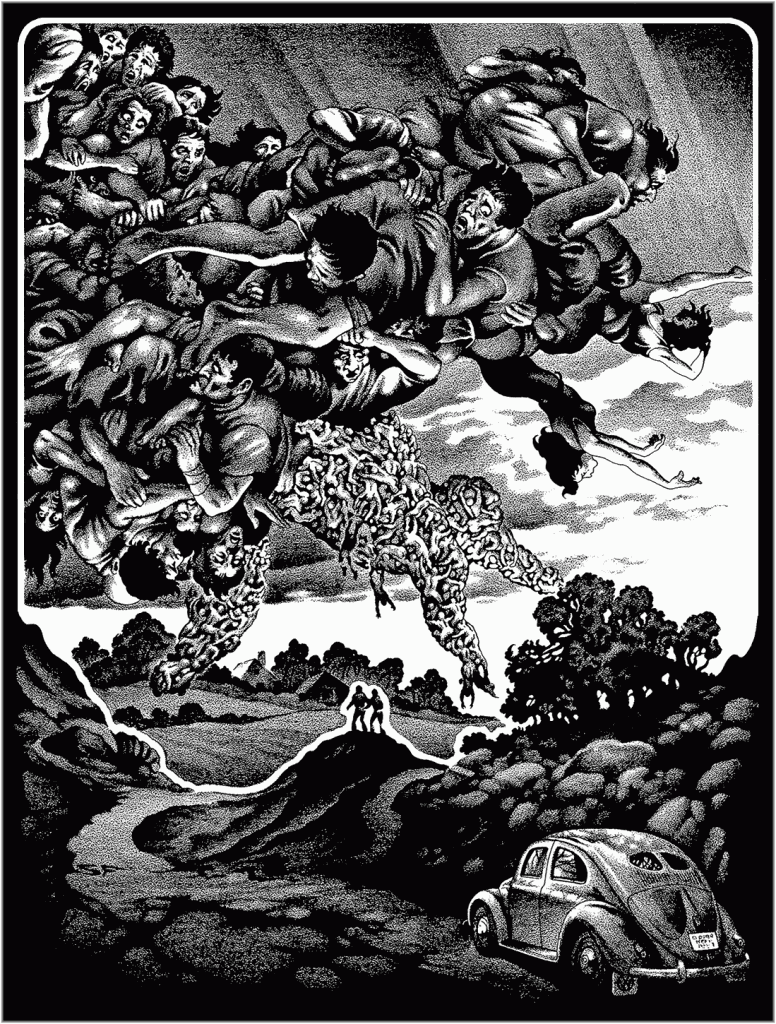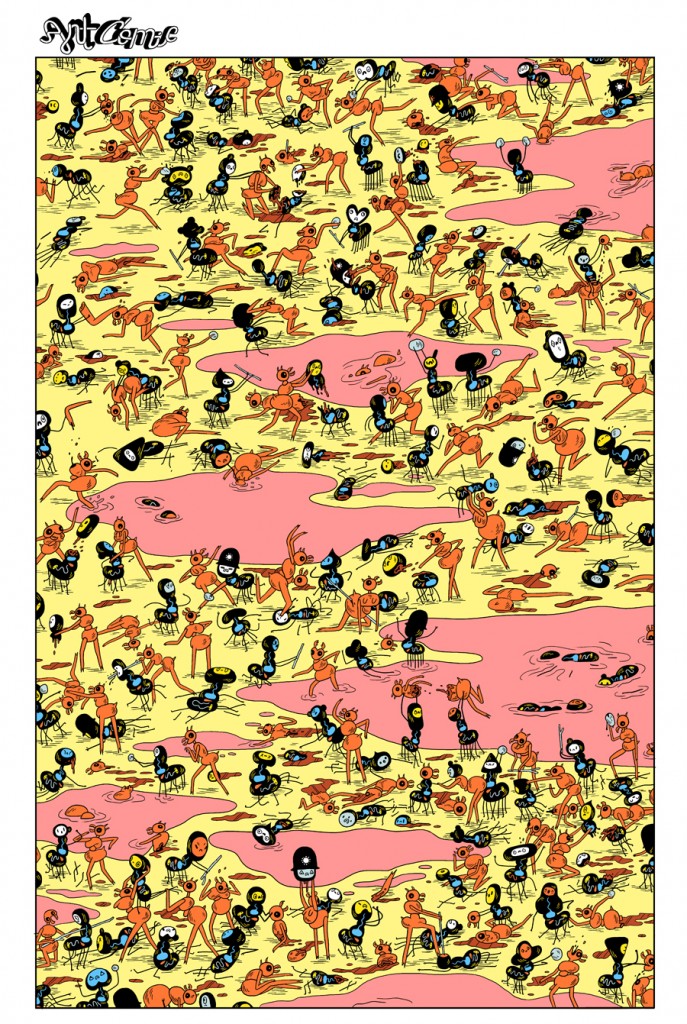Posts Tagged ‘book reviews’
Book Time/Comics Time: A Wizard of Earthsea/July Diary 2013
July 18, 2013Over at Vorpalizer, I wrote about A Wizard of Earthsea by Ursula K. LeGuin, and how it derives much of its strength from its depiction of physical and emotional isolation, a relatively rare thing for fantasy. I think it struck a nerve with people.
I also wrote about Gabrielle Bell’s July diary comics, 2013 edition. I think they’re the best she’s done.
Friday night with Vorpalizer
June 7, 2013Over the past couple of weeks I’ve written about Memory Palaces by Edie Fake, “The Sea-Bell, or Frodo’s Dreme” by J.R.R. Tolkien, “The Ghoul Man” by Jaime Hernandez, and “The Cask of Amontillado” by Edgar Allan Poe for Vorpalizer. Check them out.
Horrorshow
April 26, 2013Over at Vorpalizer, I wrote about Jordan Crane’s excellent weird Western comic “The Hand of Gold,” and about my favorite short story, Clive Barker’s “In the Hills, the Cities.”
Vorpalizer
February 6, 2013I’m going to be writing about science fiction, fantasy, horror etc. with some dayjob coworkers at our new group blog Vorpalizer.com. I got started with posts on Michael DeForge’s Ant Comic and Susan Cooper’s The Dark Is Rising. Come check it out.
Book reports
February 4, 2011One of my favorite things to do (and what this says about me I couldn’t begin to guess) is backlog enough comics reviews that I can take a few weeks off from the funnybook grind and plow my way through a suitably ambitious prose-reading project. This winter that project is apparently reading fantastic-fiction series written for young adults. First up was Susan Cooper’s The Dark Is Rising Sequence, which I’ve talked about a bit before. Christmas almost always puts me in the mood for these books, just like seeing bugs congregate around my houselights when I take the garbage out at night makes me want to re-read Stephen King’s “The Mist” every summer. The Dark Is Rising, which gave the series its name, contains some marvelously Christmasy stand-offs between good and evil in the English countryside, involving carols like “Good King Wenceslas,” constant references to Midwinter’s Day, the magical properties of holly, and so forth — the ancient Britannipagan roots of the Christmas traditions we know today. But it’s also the second book in the series; the first, Over Sea, Under Stone, was written some years before the rest and is much more a children’s mystery and much less an overt fantasy. So you kind of have to buckle down and commit to reading the whole megillah before you get to the candles and wassails and mince pies and so forth (whereas with “The Mist,” you get a sweltering summer instantly and giant insects crawling across supermarket windows within half an hour’s reading), which is an investment. But this year I felt up to the challenge, and thus over the holiday break I took a crack at the whole series for the first time in eight or nine years. I ended up quite impressed by how much mileage Cooper could get out of merely describing how her conflict between the Lords of Light and Dark — and I mean sheer description, an endless succession of infodumps. Any time our young chosen-one hero Will confronts the enemy, the rules governing their conflict are simply asserted, either by the more experienced characters or, after he reads a book that literally teaches him everything ever, by Will himself, rather than uncovered through action. It’s not a choice I’d have made, certainly…and yet it never feels lazy, somehow. Why? Because Cooper’s overriding theme is that pure Light and pure Dark are both hard masters. Having all the usual fantasy story beats arrived at not through struggle or coincidence but by through “it is the way it is, the way it must be” rules and prophecies and plans and destinies makes perfect sense in a world where even the heroes are resigned to the occasional destruction of the souls of normal humans with the misfortune to be caught up in the conflict. Don’t get me wrong, this series isn’t at all about the necessity for Hard Men In A Dangerous World; indeed I’m not sure there’s any appropriate ideological/allegorical reading to be applied to it. It’s more a combination of Cooper pursuing the brand of fantasy that most intrigued her — lofty and explicitly Arthurian — and then occasionally, and particularly in the masterful Newbery Medal-winning fourth volume The Grey King, chronicling the emotional effect such cold purity has on we hot, impure humans. It’s a fantasy series with a lot of images that shine brightly — the Black Rider, the White Rider, the Six Signs, the Afanc, the Mari Lwyd — but also sting.
Far closer to ground level is Lloyd Alexander’s Prydain Chronicles. Like Cooper, Alexander drew heavily on Welsh legends, but that’s pretty much where the similarities end. On the surface it’s the most (and prior to A Song of Ice and Fire, the only) thoroughly Tolkien-indebted fantasy series I’ve ever read, albeit one written on the reading level of The Hobbit throughout its five proper installments and subsequent collection of prequel short stories. There’s a dark lord (Arawn, Lord of Death) who rules a stronghold at the edge of the known world (Annuvin) and sends his undead thralls (the Cauldron-Born) against a motley crew of various beings (the Companions) masterminded by a wizened wizard (Dallben) and spearheaded by an unlikely-hero hick (Taran, the Assistant Pig-Keeper) and his scion-of-royalty guide (Prince Gwydion of the Sons of Don) whose home is eventually besieged (Caer Dathyl). Where Alexander distinguishes himself from the good Professor is in the welcome regularity with which he drives home the central theme of the book: “Please put in the hard work necessary to learn how to not be a jerk.” He depicts Taran’s intellectual, emotional, and ethical growth process in such detail that it’s almost an instructional volume. Taran is never swept along by the mystical conflict with which he becomes entangled on his way to becoming a hero — he trudges and marches and stumbles and picks himself back up and continues to trudge through it. In each book Taran repeatedly is faced with decisions only he can make; he makes them first impetuously, and after learning how that usually works out, with as much care and consideration as he can muster; they either work out or don’t; then — crucially — he accepts responsibility for the results of the decision, accepts the results themselves as the terrain on which he must operate, and endeavors to move forward from there. It’s a constant process of experimentation, failure, contrition, and moving forward with his friends’ support. People try to do right by each other in this book, at all costs. One sacrifice, toward the very end of the book, made me tear up, something I thought I was long past in books like these — it wasn’t even a fatal sacrifice, just one you knew tore the sacrificer’s heart out but didn’t stop him from making it to help the people he cared about. He’d learned not to be a jerk.
I tweeted about all this a few days ago, and two separate people tweeted back in virtually identical terms that the books sound like the anti-Ayn Rand. That’s precisely it. The message is that acting responsibly toward others is really the only way we can gauge responsibility to ourselves — an enormously salutary message, more so now even than when the books were first written over four decades ago. Indeed Arawn Death-Lord’s greatest evil is said to be not his warring and general sorcerous nastiness, but his theft of the skills and secrets that made everyone in Prydain’s lives better once upon a time — better ways to farm and build and sew and create. Arawn took them all and hid them in his own private Galt’s Gulch; Taran’s quest was in part to liberate them, but much more than that it was to work to find his own gifts, and his own limitations, and contribute to the lives of others as best he could.
(In that light it’s hard to find fault with Alexander for his one weakness here, which is that he’s far more willing to harm the characters his main characters care about than he is to harm those main characters, i.e. the ones he and we care about. (This made me appreciate just how much of a taboo George R.R. Martin really shattered, by the way.) Plus, Arawn, the Cauldron-Born, the Huntsmen, and the Horned King are all world-class villains, so on a fantasy-mechanics level there’s still plenty to crow about.)
Finally I’ve just now started Suzanne Collins’s The Hunger Games. I don’t know what I was expecting, prose-wise, but it certainly has that slightly-weak-YA-fiction tendency to eliminate subtext and spell everything out. If the heroine has a tragic backstory, she is going to tell you what it is in the opening chapters. If she feels one thing but is forced to say another, she’s going to describe the situation to you in pretty much exactly those terms. In other words, big surprise, the writing is not as strong as George Orwell or William Golding. Don’t go comparing dystopian apples to oranges as I did.
What it has going for it instead is two things, as best I can tell. I only got up to the actual Hunger Games — the Battle Royale-style bread-and-circuses spectacle in which tweens/teenagers from the subjugated populations are forced to fight each other to the death for the sport of the ruling class as a way to show everyone who’s boss every year — today, but obviously as with any such dystopian-future bloodsport set-up, the kill-or-be-killed nature of the Games is pure narrative napalm. You’ve got a built-in structure that keeps people turning the pages, you’ve got a ready-made cast of varying antagonists you can endow with noteworthy quirks, of course you’ve got life or death stakes, and you have the audience’s expectations that at some point your hero (or heroine, in the case of lead character Katniss) will rip the lid off the system and show the world that the game is rigged and the only way to win is not to play. Juicy, pulpy stuff, regardless of how many school summer reading lists it’s on.
The other thing (and again, I’m barely halfway through volume one, so who knows where if anywhere this all leads) is that it makes bracingly literal contemporary culture’s penchant for watching young people display themselves and/or die for our entertainment pleasure. There’s an out-of-nowhere injection of kink before the games begin — Katniss is stripped, shaved, inspected, and tarted up by a team of stylists to help her win over the crowds; she has every expectation that she may be made to perform in front of a live audience of thousands and television audience of millions stark naked, which has apparently happened to the teen contestants in the past — that fairly blew my mind at age 32; if I’d read this when I was part of the target audience I’m not sure if I’d ever think of anything else. That willingness to go there in the face of what I imagine were objections from the folks in charge of placing this thing in libraries was refreshing.
Moreover, the youth of the bloodsport contestants, as mandated by the government, reminds me not just of the simultaneously voyeuristic and condemnatory coverage of teen misbehavior upon which huge swathes of the media depend, but also of the cold hard fact that when wars are called for, what’s really being called for is for young people to travel someplace to kill people and get killed. Again, I’d imagine that if I were a teenager, this would connect with me very hard on some level, even if I weren’t able to quite articulate how.
On a sillier note, I can’t remember the last time I read a book that my mind cast with actors as quickly and irrevocably as it did here. Katniss is Kristen Stewart, skin tone be damned; Gale is Talyor Lautner; Peeta is Armie Hammer minus a few years; Effie is birther queen Orly Taitz with the voice of that “great, great, really great!” woman from Elaine’s office in Seinfeld; Haymitch is Lieutenant Eckhardt from Tim Burton’s Batman; Cinna’s the guy who runs the New York City bridal salon on Say Yes to the Dress. I wonder who will be brutally murdered next.
Playing a Game of Thrones: Why you should read George R.R. Martin’s A Song of Ice and Fire series
January 18, 2011Regular readers of this blog are no doubt aware (to say the least!) that I am a big fan of George R.R. Martin’s series of fantasy novels called A Song of Ice and Fire, and that I’m eagerly anticipating the HBO series adapting them, called Game of Thrones. But a few days ago I realized that you might not know why. Credit for this goes to my blogging chum Curt Purcell, who used the occasion of my umpty-millionth post on the topic to ask:
Without giving too much away, can you maybe hit a few bullet-points about what sets SONG OF ICE AND FIRE apart from other similar fantasy series? It sounds so run-of-the-mill, even when people gush about it. What am I missing that would make me want to read it?
As I said in the comment I left to answer his questions, I’m such an enthusiast for this material that I don’t know if I’ll be any good at expressing or explaining why. (I’m also emotionally and physically exhausted due to all sorts of off-blog goings-on this past week and am not at my most cogent.) But I’ll take a shot at running down some of the series’ distinguishing characteristics. Sit back, relax, and enjoy the hard sell.
First off, what exactly are we talking about here? Well, as I said, A Song of Ice and Fire is a series of epic fantasy novels by writer George R.R. Martin, whom some comic fans and nerds may know from his involvement with the Wild Cards series of revisionist-superhero prose novels, or for his time on the writing staff for the Ron Perlman/Linda Hamilton Beauty and the Beast TV show. So far, four volumes of a (sort-of^) planned seven have been released: A Game of Thrones, A Clash of Kings, A Storm of Swords, and A Feast for Crows. The HBO series, spearheaded by David Benioff and Dan Weiss, takes its title (sans indefinite article) from the first volume and will debut on April 17; the plan is to adapt one book per season, although the books get so long that some may need to be spread over the course of two seasons.
What’s the setting? Without spoiling anything important, here goes: The books take place mostly in a land called Westeros, your basic roughly medieval-European epic fantasy setting, albeit one with far, far fewer overt trappings of fantasy than, say The Lord of the Rings — humans are the only game in town in terms of races, and we’re several generations removed from the last time magic/sorcery or mythical creatures like dragons were a going concern. The main fantastical feature when the story begins is how the flow of seasons work: Summer and winter can each last for years, decades even, before shifting unpredictably.
Westeros, which ranges from an arctic climate up north to a Mediterranean one down south and has similar cultural lines of demarcation, was once divided up into Seven Kingdoms, each ruled by great families, or Houses. But for centuries now, the whole continent has been united under one ruling King. However, about 15 years or so before the story begins, a group of powerful Houses banded together to overthrow the current king, who had gone insane, thus ending the kingdom’s first and up until that point only dynasty.
What’s the story about? Again, without spoiling anything important: It’s 15 years after Mad King Aerys of House Targaryen was overthrown by an alliance of nobles who were either burned by his cruelty or hungry for power of their own, or some combination thereof. The leader of the alliance, Robert Baratheon, has been king ever since, supported by his wife’s hugely influential, hugely assholish family, House Lannister. But when his mentor and right-hand man dies (or is murdered — no one’s really sure), Robert, who seems well-intentioned but by now is kind of a drunk and glutton and horndog and not a very good king, heads north to seek the help of his best friend, Eddard Stark, who has command of the kingdom’s distinctly unglamorous northernmost area. A Game of Thrones primarily chronicles the conflicts between House Stark and House Lannister as Ned, as he’s known to his friends, tries to help out King Robert and get to the bottom of the mystery of their mutual mentor’s death, and some other shady goings-on as well.
But meanwhile, two threats are brewing beyond the kingdom’s borders and outside the struggle for power and influence surrounding the rival Houses. The first lies in the uncivilized wastelands to the North, beyond a massive Great Wall of China-type structure called The Wall, a 700-foot-tall barrier made totally of ice that stretches from sea to sea. Thousands of years ago some kind of supernatural menace came out of the North to threaten the Seven Kingdoms, and the Wall was constructed after mankind’s victory to keep the threat from coming back. By now it’s been so long that the organization tasked with maintaining the wall is a neglected, ragtag band, ill-prepared for…whatever it is that seems to be going on out there, somewhere.
The other lies overseas, where the only two survivors of the overthrow of House Targaryen, a boy named Viserys and a girl named Danaerys, have hit their teenage years and are trying to mount a comeback. Even though Aerys was a major creep, and Viserys is no great shakes either, if the two of them get the right backers and the right soldiers, they could present a major threat to the new rulers of their old kingdom, who know they’re out there but have no idea how to find them.
Why should I care about any of this? This is really the heart of Curt’s question, and probably yours, if you have a question about the series yourself. Chances are you either are perfectly conversant and comfortable with the standard tropes of fantasy and thus this series’ specific iterations thereof aren’t enough to hook you, or you’re the sort of person who automatically tunes out anytime someone in a tunic whips out a sword and says “I am Aragorn son of Arathorn, heir to the throne of Gondor” or somesuch and thus you’re skeptical that the books would be for you even if they’re the best gosh-darn stories about a made-up kingdom of knights and dragons and shit ever invented. With all of you in mind, I put together a list of what sets the books apart, both for me and, from what I’ve gathered based on talking to and reading about other fans, for a lot of people. This is the stuff that matters.
1) I mentioned this already, but it bears repeating: The fantasy elements are surprisingly minimal, particularly at first. Simply put, if you’re the kind of person who can’t stand elves and orcs and dwarves and wise old wizards, they won’t be around to turn you off out of hand. Now, this wasn’t really a selling point for me, since I’m a person who has the White Tree of Gondor tattooed on my left arm and obviously has no preexisting, in-principle problem with elves and orcs and dwarves and things of that nature. But I think you’d be surprised at how little high/epic fantasy I’ve actually read outside of The Lord of the Rings. The vast majority of my fantasy reading was done when I was a YA reader, and was centered either on satires (Piers Anthony’s Xanth books, Robert Asprin’s Myth series) or sort of off-model, less Tolkienian series (this is the stuff I remember more fondly — Susan Cooper’s The Dark Is Rising Sequence, Ursula K. LeGuin’s Earthsea trilogy, and Lloyd Alexander’s Prydain Chronicles, the most Tolkienian of the group but still pretty far removed from the Elves/Dwarves/Orcs model that dominates much of the genre)). In my mind, I’d come to associate stuff that more directly bore the fingerprints of Professor T or his Gygaxian reinterpreters with either unoriginality, tedium, or cheese. So a series that focused more on character and worldbuilding in the cultural and historical senses of that word than on invented races or bestiaries or magical systems was perfect for me when deciding to give fantasy another try at age thirtysomething.
2) A closely related point: In the absence of magical stuff, the story’s driven by realistic human conflicts. Martin has said that the series’ central struggle for power — the titular game of thrones played by various important people we meet — was inspired by England’s real-world War of the Roses, with its complex web of family loyalties and regional rivalries and so on. In terms of narrative fiction, I think the the closest comparison is The Godfather and The Godfather Part II. A Game of Thrones combines the first film’s story of rival families violently jockeying for supremacy amid all sorts of complex conspiracies and alliances with the second film’s story of the very serious, very smart leader of one of those families trying to uncover the origin of a plot against him and his. The point is that we’re very far from rote Joseph Campbell hero’s-journey fantasy storytelling, with some dude learning it’s his destiny to defeat the Dark Lord. If you’re sick of that sort of thing, you’ll find a lot more to hook you here. This goes double if you’re the sort of person who’s ever enjoyed fictional or non-fictional war epics or gangster stories. “The Sopranos with swords” really is a pretty dead-on way to describe what’s going on here.
3) Another reason “The Sopranos with swords” works, and probably one of the big reasons HBO bit: There’s graphic language, violence, and sex. Again, I’m not particularly well-read in the genre, but this is something I’ve really never seen before, not outside weirdo projects like CF’s Powr Mastrs — and this isn’t some cult-favorite alternative comic series, it’s the most popular and influential contemporary fantasy series other than Robert Jordan’s Wheel of Time. If you’re the sort of person who’s complained that Tolkien’s world is too sexless and bloodless to really care about, believe me, you won’t be voicing similar complaints here. I’ll elaborate on this a bit below, but I also would argue strongly against the notion that any of this is shock for shock’s sake, or rote revisionism. It’s simply Martin writing fantasy the way other writers would write about any other world full of human beings who kill each other and have sex and get pissed off. It’s refreshing. “Deadwood with swords” works here.
4) One last related point: The story isn’t just set in a (relatively) realistic world, driven by realistic human conflicts, and featuring realistic human behavior — it’s powered by relatable human relationships, emotions, drives, desires, and even mistakes. I’ve written about this at length before in somewhat spoilery fashion, but to recap it here, so much of what happens in these books hinges on the personal relationships between the characters, and the way old grudges or old friendships cloud judgment and lead to poor decisions. Perfectly well-intentioned, innately noble characters can’t stand other perfectly well-intentioned, innately noble characters for various reasons that are all too familiar — long-ago affairs, half-forgotten insults, petty jealousies. Characters will know full well that their family is a collection of really awful people, but they’ll still do their level best to help out because hey, it’s family, and it’s psychologically and emotionally tough as hell to leave your family behind. In other words, like all of the best HBO shows did with their respective genres — The Sopranos with the mafia, Deadwood with Westerns, The Wire with cop shows — A Song of Ice and Fire isn’t just surface revisionism, it’s bringing the full weight of richness of literary fiction to genre entertainment.
5) Moving on, here’s a point about the basic logistics of reading these books: The structure of the narrative is highly addictive. Each chapter focuses on a particular character, whose name serves as that chapter’s title, and the characters rotate throughout the book(s). This has the effect of embroiling you in a particular character’s situation or storyline, then immediately popping you over into another’s, so that you find yourself racing through the chapters to get to the next one starring the person you’re interested in — and then getting interested in the ones you’re reading in the interim, and repeating the process over and over. It’s rather brilliant.
6) The raw plot is enormously engrossing. There’s a dynastic struggle that encompasses a murder mystery, a conspiracy, shifting and secret alliances, political machinations — and then brewing underneath it all, two major external threats. You find yourself wanting almost desperately to get to the bottom of it all, and Martin is a strong enough writer to keep adding elements without drowning out the ones that hooked you in the first place. A good comparison here might be Lost, where each time you hit the ground level of the until-then central strain of antagonism, the creators yanked the rug out and revealed another beneath it. The shape and scope of the story is perpetually enriching and expanding.
7) I think Martin’s a pretty strong prose craftsman. There are a few groaners in there, especially in the first book (I think there are two warm fires in the hearth that couldn’t chase away the coldness in Character X and Y’s hearts, for example), but let’s just say that my dayjob sees a lot of SF/F pass across my desk and some of it is embarrassingly badly written. Martin knows his way around the typewriter.
8.) Big surprises, as shocking and powerful as any I’ve read or seen in any work of narrative fiction ever. Stuff that’s on the level of all-time gut-punches like “I did it thirty-five minutes ago” or “You are the dead” (or for you altcomix readers, the big moments in ACME Novelty Library #20 or Love & Rockets: New Stories #3). You want to stay as spoiler-free as possible about these books, that’s all I’ll say. Like, if you start reading them, don’t even read the back-cover or inside-flap blurbs. (Seriously, DON’T.) This is not to say that if you know the surprises, you won’t enjoy the books — I knew one of ’em and still loved it, just like I knew all of the major deaths in The Sopranos through Season Four and still loved it — but man oh man. There’s one part that had me so stunned and upset I literally lost sleep over it, and sat there rereading the chapter, sure I must have missed something or somehow gotten what I’d read wrong. I didn’t. It was awesome.
9) This is hard to articulate without spoiling the grand arcs of the narrative, but suffice it to say that having read all four currently existing volumes, Martin is playing an impressively long game. I don’t want to say too much more, but when you’ve read enough to start getting a sense of where it may head in the final three volumes, it’s kind of stunning in scope. Seeds planted in the first volume are carefully cultivated and tended to for multiple books and multiple years and multiple thousands of pages and still haven’t blossomed yet. Best of all, I think this all ties to one of the central themes of the series, but again, I don’t want to spoil anything.
10) This one’s important: There’s basically nothing glorious or badass whatsoever about violence as portrayed in these books. Most great fantasies don’t skimp on the emotional consequences of being enmeshed in these great struggles — the scouring of the Shire and Frodo’s departure are obviously the beating heart of The Lord of the Rings just for starters — but I don’t think I’ve ever read a heroic fiction that so relentlessly drives home how war and violence immiserate and degrade everyone who participates in them. There’s a haunting flashback in the first volume that in other hands would have been a depiction of some great and glorious last stand, but Martin imbues it so thoroughly with a sense of great sadness and loss and waste and terror. It’s beautiful and really humanistic. Now, I know Tom Spurgeon, who’s no dummy, disagrees with me on how the violence in the book comes across — he thinks it’s Mark Millar’s Ultimate Lord of the Rings, not because he feels Martin is glib or crass or glorifying the violence, mind you, but simply because he feels the use of violence is primarily calculated to get the material over with maximum genre-tweaking impact — but as he’ll also tell you, he’s in a very small minority on this. Martin, as it turns out, was a conscientious objector during the Vietnam War; I know that doesn’t necessarily reveal a fundamental truth about him beyond “he really didn’t want to go to Vietnam,” but in reading these books, I think his draft board made the right call.
11) That said, when there is action and violence, it’s really strong and really heart-pounding. And when there is fantasy, it’s exciting and strange and awesome, in the original sense of the word. The reason why is the same in both cases: We know that in this world, both swordplay and the supernatural have irrevocable, terrible, life-changing, world-altering consequences.
In short (haha, yeah right), I’m about to say something that I pretty much never say, even about works I deeply love and even to readers whose tastes I feel I understand deeply: I recommend these books without hesitation or qualification. And I’ve done so to readers ranging from my Destructor compadre Matt Wiegle to the fiftysomething mother of two grown children who works in the cubicle next to me, all of whom are basically over the moon for them. If you look into ASoIaF fandom at all, you’ll find this story repeated over and over: Fantasy skeptic gets enthusiastic recommendation from trusted friend, says “What the hell, I’ll give it fifty pages,” and within hours is passing on enthusiastic recommendations of their own. Consider this mine.
^ Why the “sort of”? The series was originally envisioned as a trilogy, but it grew to four volumes and then to six as Martin wrote the initial volumes. When he hit the writing process for the fourth book, he realized the amount of material he wanted to cover would require the book to be split in half even just as a logistical matter, so the series is now slated seven books long. This decision, plus his decision to scrap a planned “five-year jump” for the story between volumes three and four and his subsequent need to re-write and re-conceive a lot of existing work, led to a lengthy delay between A Storm of Swords and A Feast for Crows and a positively infamous delay between Crows and the planned fifth volume, A Dance with Dragons. Martin seemed to have planned to announce a publication date for Dragons during the TCA press tour last week, but an illness around Christmastime sideswiped him; still, I expect an announcement on the book before or when the HBO series debuts in April. (back)

